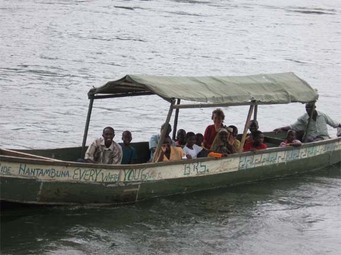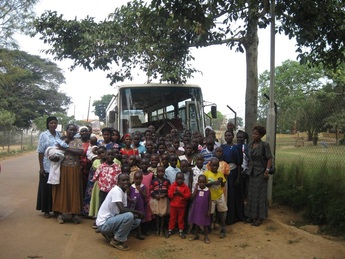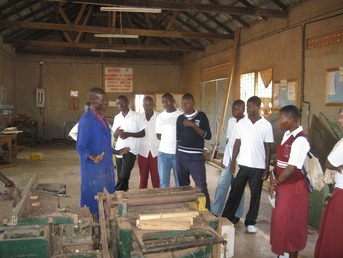Field trips

2007 - Source of the Nile
Most of the children in Bulumagi have never been out of the village. Just six miles away is Jinja, the second largest town in Uganda. Jinja is the site of what is considered to be the source of the Nile River. Boat rides are available to take you out to the point where the Nile leaves Lake Victoria.
We took a group of sponsored children with one of their relatives on an outing to visit Jinja. All the children and some of the mothers, aunts, and grandmothers went out in the boat. After a fun time at the source, we had lunch in a local restaurant. This was the first time any of our Bulumagi friends had been in a restaurant. They ate heartily and politely returned their empty plates to the wait staff. Much fun was had by all!
Most of the children in Bulumagi have never been out of the village. Just six miles away is Jinja, the second largest town in Uganda. Jinja is the site of what is considered to be the source of the Nile River. Boat rides are available to take you out to the point where the Nile leaves Lake Victoria.
We took a group of sponsored children with one of their relatives on an outing to visit Jinja. All the children and some of the mothers, aunts, and grandmothers went out in the boat. After a fun time at the source, we had lunch in a local restaurant. This was the first time any of our Bulumagi friends had been in a restaurant. They ate heartily and politely returned their empty plates to the wait staff. Much fun was had by all!

2009 - Uganda Wildlife Education Center in Entebbe
In 2009, we rented a bus to take the growing number of sponsored children to a wildlife refuge in Entebbe, a distance of 70 miles from Bulumagi. The route took us through Kampala, the capital of their country and a place none had ever been. It also went by the president’s house. After visiting the animals and having lunch, the children played on swings and other rides in a playground on the premises of the refuge. To cap off the day, we went to the airport in Entebbe so they could see planes which were a big hit! Soon after, we found some of the children listing “pilot” as what they’d like to be when they grow up.
In 2009, we rented a bus to take the growing number of sponsored children to a wildlife refuge in Entebbe, a distance of 70 miles from Bulumagi. The route took us through Kampala, the capital of their country and a place none had ever been. It also went by the president’s house. After visiting the animals and having lunch, the children played on swings and other rides in a playground on the premises of the refuge. To cap off the day, we went to the airport in Entebbe so they could see planes which were a big hit! Soon after, we found some of the children listing “pilot” as what they’d like to be when they grow up.

2013 - Nile Vocational Institute
Some of the sponsored children are now teenagers! While some of these young adults are excelling academically, going to a university is not easy without the financial aid and loans available in many countries. For many of these students, a vocational education is a better option.
One afternoon we took 12 secondary (high school) students on a field trip to nearby Nile Vocational Institute, which provides programs in building, carpentry, electrical, plumbing, engine repair, hospitality, hairdressing, and a number of other areas. If academics is not for them, we want them to have options beyond the subsistence farming that barely sustains most of their families.
Some of the sponsored children are now teenagers! While some of these young adults are excelling academically, going to a university is not easy without the financial aid and loans available in many countries. For many of these students, a vocational education is a better option.
One afternoon we took 12 secondary (high school) students on a field trip to nearby Nile Vocational Institute, which provides programs in building, carpentry, electrical, plumbing, engine repair, hospitality, hairdressing, and a number of other areas. If academics is not for them, we want them to have options beyond the subsistence farming that barely sustains most of their families.
